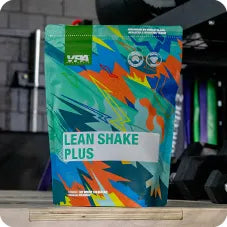Your Cart is Empty
Is protein one of the secrets for weight loss?
December 01, 2019 5 min read

A while ago, I presented at a small conference on the subject of protein for weight-loss as I feel like it is a subject that is undervalued by a lot of dietitians. Since I am a Gary Vee fanboy and love his idea of pillar content, I figured I would turn aspects of that presentation into this blog post and share it on a larger scale to answer the question, is protein one of the secrets for weight loss?
My background prior to studying nutrition at university started with an excessive amount of time reading the forums on bodybuilding.com during 2012, followed by even more procrastination in the form of being an active member of a niche bodybuilding/powerlifting forum from 2013-2014. I feel like this has given me a different perspective to other dietitians who have come from different backgrounds. The thing that peaked my interest and has stayed with me to this day is the fact that the recreational bodybuilders tended to have high calorie requirements. Their calorie requirements grew year after year as their metabolism got faster since they were consistently gaining more muscle. Most of these people struggled to eat enough calories to maintain their weight and had to force feed themselves to gain weight. The extreme dieting involved in contest preparation appears to negatively affect metabolic rates considerably, but the people who weren’t competing were often eating a ridiculously high number of calories in comparison to the average person.
Protein and short term weight loss
The reason why this title is such a click-bait title, is because we all know that there is no secret to weight-loss. What IS necessary though is a calorie deficit. There are so many ways to achieve this, and they don’t all require a high protein intake. I believe that a higher protein intake will make it easier to stay in a calorie deficit though.
The research is clear that protein is the most satiating of all the macronutrients. If you eat 1500 calories per day and have 30% of your calories coming from protein, you will likely feel fuller than if you had 15% of your calories coming from protein. If you have a higher protein intake, eat plenty of low-calorie vegetables and drink a lot of water, you can physically stuff yourself full before reaching your calorie target for weight-loss.
Protein and long term weight loss
From a practical perspective I have found that I need to get clients results in the short-term for them to buy into my system well enough to get great results over the long-term. The long-term stuff is what I really care about though.
On average when people diet while eating the NRV for protein (0.84g/kg), ~50% of the weight-loss comes from muscle if their activity is unchanged. If they regain weight, only 1/3 comes back as muscle. There is no doubt that eating at 2x the NRV or 3x the NRV for protein results in far better preservation of muscle mass during weight-loss. Since muscle is the biggest factor in our metabolic rate, it makes sense that keeping as much muscle as possible during weight loss should be a priority.
How much protein do I need to eat?
The amount of protein needed really depends on the individual. The main thing it depends on is how lean somebody already is, because the needs are based on metabolically active tissue. For people who are already relatively lean (e.g. athletes) and performing resistance training with the goal of optimising muscle mass the target should be between 1.6-2.2g/kg of bodyweight. This is so well studied that it is not up for debate. Some special snowflakes might perform better at a higher target or lower target, but these are extreme outliers. For people who are ridiculously lean (e.g. competitive bodybuilders prepping for a show) the target goes up to 2.3-3.1g/kg of fat free mass.
In most cases, regular people looking to lose weight will be at a higher body fat percentage. For these people the target would be lower. ~1.4g/kg of body weight is a solid target for a lot of the people I see, but the higher a person’s body fat percentage the lower the number would be since it is based on metabolically active tissue.
When should I eat protein?
Ideally spread the protein out evenly across the day. This has been shown to create slightly better results. Don’t be fooled into believe that “the body can only absorb 20-25g of protein in a single sitting” since the research is clear that you can absorb way more than that, and what really matters is your total intake. In a perfect world, if somebody was having 100g protein per day, it would be split over something like 4 meals of 25g of protein. This is not always practical for everybody though.
Practical strategies for eating enough protein
Usually the first thing I push for is ensuring there are at least two decent servings of protein throughout the day. Generally, this will be at lunch and dinner since most people enjoy lower protein breakfasts. Often lunch will still have a smaller portion of protein than dinner, since people habitually have larger dinners than lunches.
The next step I will take is adding in higher protein snacks. My go to that people most commonly go to is adding in a higher protein nut bar, or higher protein yoghurt which is low fat and no added sugar. This will add in 20-25g of protein just coming from snacks that most people are going to enjoy anyway. Most of the time I would opt for flavoured yoghurts rather than natural flavoured ones, to help improve compliance/enjoyment over the longer term.
Another strategy can be using a protein supplement. Whey Protein Isolate is a high quality option which I would view as the gold standard. It isn’t necessarily better than reaching the same protein target through food, but there are times when it is far more convenient since it requires zero prep time and you can also easily take it on the go.
Take home messages
Meeting your protein requirements (which are often higher than some will lead you to believe) will make it easier to stay in a calorie deficit over the short term and the long term. Over a smaller timeframe, it helps by making it easier to manage your appetite. On a larger scale, it will help keep your metabolic rate higher, which will make it easier to maintain a calorie deficit.
Also in Supplements

The Ultimate 12-Week HYROX Training Plan (Beginner-Friendly + Expert-Approved)
December 04, 2025 7 min read
Read More
What Is HYROX? The Complete Beginner’s Guide to the World’s Fastest-Growing Fitness Race
December 04, 2025 8 min read
Read More
The Ultimate HYROX Fuel Plan: When and How to Use Energy Gels for Maximum Output
October 15, 2025 6 min read
Read More Recent Articles
- The Ultimate 12-Week HYROX Training Plan (Beginner-Friendly + Expert-Approved)
- What Is HYROX? The Complete Beginner’s Guide to the World’s Fastest-Growing Fitness Race
- The Ultimate HYROX Fuel Plan: When and How to Use Energy Gels for Maximum Output
- Collagen for Tendon Repair: Can Supplements Support Recovery?
- What Is Creatine Monohydrate? Benefits, Safety & How to Use It
- How Is Creatine Made? (Natural, Synthetic & Quality Standards Explained)
- What’s the Best Creatine in Australia? Here’s Why Monohydrate Still Reigns Supreme
- What Is Whey Protein? A Beginner’s Guide
- 7 Best Protein Powders in Australia (Taste-Tested August 2025)
- Why Does Beta‑Alanine Cause Tingling? (What’s Behind the Beta‑Alanine Tingle)
${{amount}}













